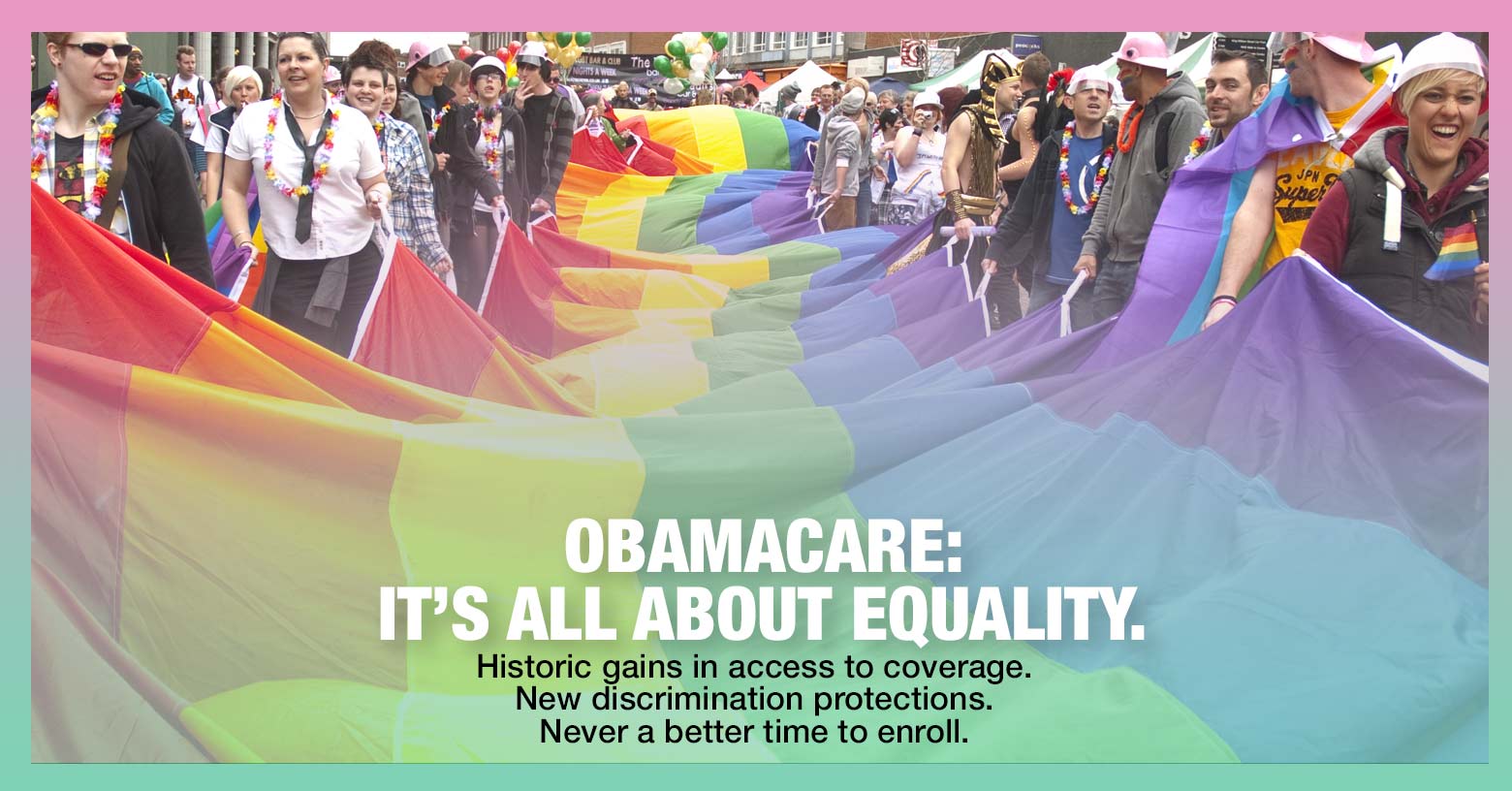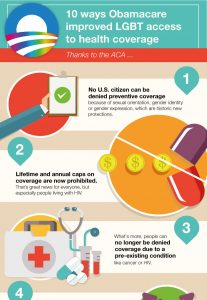
If you’re not lesbian, gay, bisexual or transgender, it might be tough to appreciate just how important the Affordable Care Act (ACA) is to the LGBT community. Thanks to the ACA, LGBT people have better healthcare access, a lower uninsured rate — and better protections against discrimination — than ever before.
These gains are historic. And there’s no better time to further advance those gains than during the week of December 7-11, 2015, which has been designated as an LGBT Week of Action by the White House, the U.S. Department of Health and Human Services and enrollment partners.
“We want people to feel empowered to look at their coverage options, see what works for them, and be part of this historic change,” says Kellan Baker, a senior fellow at the Center for American Progress (CAP) and a steering committee member for Out2Enroll, a national initiative to connect LGBT people with health insurance options under the ACA, or Obamacare.
During the LGBT Week of Action, there will be a variety of events to reach out to — and educate — people who still need to enroll. All the details are posted at Out2Enroll.
Good policy news for LGBT people
Baker says two major policy developments in 2015 directly impact insurance access for LGBT people.

10 ways Obamacare improved LGBT access to health coverage (infographic)
The first is the U.S. Supreme Court decision legalizing same-sex marriage. As Baker points out, marriage is “deeply intertwined with benefits,” and getting married is a special enrollment trigger. Married people are now treated the same way in the insurance marketplace whether they’re gay or straight.
In related news, on December 1 the Centers for Medicare & Medicaid Services (CMS) issued new guidance requiring state Medicaid programs to recognize same-sex marriages.
The second big policy shift focuses on additional steps to strengthen Section 1557 of the ACA, which includes non-discrimination protections for LGBT people. Although Section 1557 has been the law since the ACA was passed in 2010, the non-discrimination protections aren’t always enforced. Some insurance policies still exclude coverage that LGBT people might need, such as hormone therapy for transgender people. LGBT people also continue to face discrimination by healthcare providers.
Recognizing this ongoing challenge, the HHS Office for Civil Rights has implemented a process that makes it easy for LGBT people to report discrimination. Out2Enroll provided training to HHS personnel so they’re prepared to process these complaints.
“The only way regulators know is if people report their bad experiences,” Baker says. “If someone’s plan isn’t covering the services they need as a transgender person, or a baby’s pediatrician refuses to see her because she doesn’t approve of her lesbian parents, they need to tell their story to regulators.”
He says the experience of a lesbian couple in Michigan whose pediatrician turned them away is one of the stories Out2Enroll shares with regulators to help them understand why enforcing Section 1557 is so important.
“So many transgender people and gay people are just accustomed to hiding, and feeling like they’re going to be discriminated against, that they wonder why they should expose themselves to that,” Baker says. “That’s why we’re working with enrollment assisters and civil rights regulators to make sure people know there are protections now that weren’t there before.”
Investigation and resolution of discrimination cases is already underway at the HHS Office for Civil Rights. Reporting discrimination is simple – no legal expertise required. Simply visit hhs.gov/ocr and file a complaint.
“Don’t just tell your friends,” Baker adds. “Tell someone who can do something about it.”
No better time to take action
There are two key points Baker wants the LGBT community to remember during the Week of Action and beyond.
“Get covered, be part of history and avoid paying the fine for not having insurance,” he says. “And make your coverage and healthcare work for you. If you’re not getting what you need, assert your rights.”
Take note: The deadline to sign up for coverage that begins on January 1, 2016, is December 15th. About 80 percent of people who enroll qualify for tax subsidies that make insurance less expensive. And with the penalty for not having insurance in 2016 going up to $695 or 2.5 percent of your annual income, whichever is greater, it may be less expensive to sign up for insurance than to pay the penalty.
Amy Lynn Smith is a writer and communications strategist who specializes in healthcare and issue advocacy. She creates empowering, educational content that encourages people to be more engaged in their own health, wellness and decision-making – from the doctor’s office to the ballot box.


